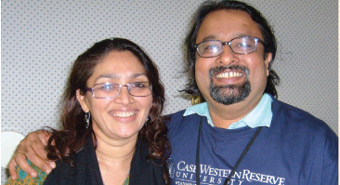- Home
- Archive -Sept 2008
- Learning to dre. . .

Learning to dream
- In :
- Personal Growth
September 2008
By Jamuna Rangachari
Appreciative Inquiry looks at what works as a springboard for inspired action. Catch R Sankar and Wasundhara Joshi presenting this unique workshop at the LP Expo 2008
 |
I realised that I feel much more energised today as I focus on the positive aspects, even when trying to bring about change,” says Neena, adding that this approach has made her much more effective in all her dealings, including those with the BMC (Bombay Municipal Corporation), with whom she used to take a very judgmental stance earlier.
“I have realised that understanding oneself needs to be the first step. Only then can one be effective in the next step of understanding the other,” shares Suchita.These and many more personal insights of transformation formed the order of the day in the Appreciative Inquiry (AI) workshop at SNEHA (The Society of Nutrition, Education & Health Action), an NGO that addresses the special needs of women and children in urban slums.
Appreciative Inquiry is a technique of asking questions and envisioning the future that fosters positive relationships and builds on the basic goodness in a person, a situation, or an organisation. Developed by David Cooperrider and Suresh Srivastava in the 1980s, the approach is based on the premise that ‘organisations change in the direction in which they inquire. So an organisation which inquires into problems will keep finding problems but an organisation which attempts to appreciate what is best in itself will discover more and more of all that is good. It can then use these discoveries to build a new future where the best becomes more common.
There are four stages in the AI approach:
Discover – people talk to one another to discover the times when the organisation is at its best. These stories are told as richly as possible.
Dream – the dream phase is where people are encouraged to envision the organisation as if the peak moments discovered in the ‘discover’ phase were the norm rather than exception. Design—a small team is empowered to go away and design ways of creating the organisational dreams.
Destiny—the final phase where the changes are implemented. AI has been used extensively to foster change in businesses, health care systems, social profit organisations, educational institutions, communities, local governments, and even, religious institutions. “Though I have applied a variety of management techniques, it is only through AI, that my whole approach changed from seeing gaps to perceiving possibilities,” averred Sankar who conducted the workshop along with Dr Wasundhara Joshi (Wasu). “The focus on positive areas is something I consciously apply in my personal and professional life,” adds Wasu, who has seen through the entire gamut of transformation in SNEHA and other organisations and is now totally committed to AI.One can see why. Plotting a timeline since SNEHA began its activities, Sankar and Wasundhara gently prodded the participants to recollect their moments of euphoria in SNEHA. The joy was palpable as each person noted his eureka moment, sharing, discussing and energising each other. Even before Sankar stated the core principle of AI as, “The whole point of the exercise is to create an environment where moments of excellence become the norm rather than an exception,” the participants had begun discussing how they could replicate their ‘peak’ experiences more often.
“Though initially sceptical, the CEO of a pharmaceutical company was stunned at the motivation levels of his staff at the end of an Appreciative Inquiry session,” Sankar recounts. As I step out, I realise that most of the points in the organisational value statement arrived at by the participants of the workshop, “empathy, a non-judgmental attitude, creativity, respect, trust and freedom”, could be an apt dictum for all of us at all times.
We welcome your comments and suggestions on this article. Mail us at editor@lifepositive.net
To read more such articles on personal growth, inspirations and positivity, subscribe to our digital magazine at subscribe here
Life Positive follows a stringent review publishing mechanism. Every review received undergoes -
- 1. A mobile number and email ID verification check
- 2. Analysis by our seeker happiness team to double check for authenticity
- 3. Cross-checking, if required, by speaking to the seeker posting the review
Only after we're satisfied about the authenticity of a review is it allowed to go live on our website
Our award winning customer care team is available from 9 a.m to 9 p.m everyday
The Life Positive seal of trust implies:-
-
Standards guarantee:
All our healers and therapists undergo training and/or certification from authorized bodies before becoming professionals. They have a minimum professional experience of one year
-
Genuineness guarantee:
All our healers and therapists are genuinely passionate about doing service. They do their very best to help seekers (patients) live better lives.
-
Payment security:
All payments made to our healers are secure up to the point wherein if any session is paid for, it will be honoured dutifully and delivered promptly
-
Anonymity guarantee:
Every seekers (patients) details will always remain 100% confidential and will never be disclosed
